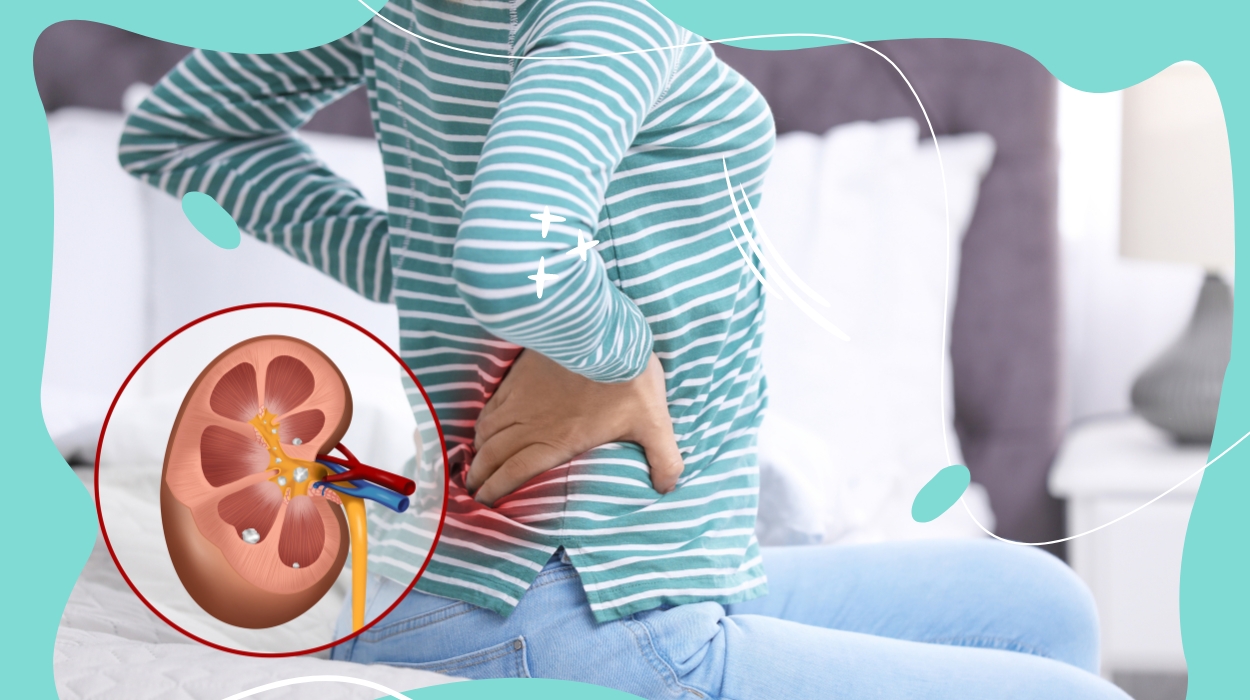 Expert's opinion
Expert's opinion
Expert's opinion
The article is a subjective view on this topic written by writers specializing in medical writing.
It may reflect on a personal journey surrounding struggles with an illness or medical condition, involve product comparisons, diet considerations, or other health-related opinions.
Although the view is entirely that of the writer, it is based on academic experiences and scientific research they have conducted; it is fact-checked by a team of degreed medical experts, and validated by sources attached to the article.
The numbers in parenthesis (1,2,3) will take you to clickable links to related scientific papers.
How Does A Woman Know If She Passed A Kidney Stone? 5 Symptoms To Know

Kidney stones are a fairly common condition that can be extremely painful. Even a small kidney stone can cause significant discomfort.[1]
People who have had multiple stones before are usually able to tell when they are passing a kidney stone. However, people who have never had one before may not be able to tell the difference between kidney stones and gastrointestinal problems.
Knowing the signs and symptoms of kidney stones can help you decide what kind of at-home remedies to use or whether or not to seek medical treatment.
How Does A Woman Know She Passed A Kidney Stone?
There are many symptoms that indicate you are about to pass a kidney stone. These include:
- Back, flank, abdominal, or groin pain.
- Frequent urination.
- Burning with urination.
- Nausea and vomiting.
- Blood in the urine.
- Stones appearing in the urine.
If you are concerned about a kidney stone, your doctor can look at your urinary system with an ultrasound machine or a computed tomography scan.
Kidney Stone Symptoms For Women
When a woman is passing a kidney stone, she may have trouble figuring out exactly what is happening. Passing a kidney stone can feel similar to severe menstrual cramps or a urinary tract infection.
Watching for the following signs of kidney stones can help you determine if you are having kidney stone symptoms, or if your problem is being caused by something else.
Severe Pain
One of the most well-known signs of a kidney stone is severe pain. As the stone moves through your urinary tract, you will probably experience severe back, flank, and abdominal pain.
Bloody Urine
Blood in your urine[2] is a common symptom of kidney stones. However, not all kidney stones cause visible bleeding. Doctors may be able to do a urine test to look for microscopic drops of blood in your urine. Urinating blood is a problem, no matter how small the drops of blood are.
Burning With Urine Flow
Passing a kidney stone causes burning with urination. As the stone reaches your urethra, it can cause damage, which is then irritated by urine as it passes through the urinary system.
Nausea & Vomiting
As a kidney stone passes through your urinary tract, you may experience nausea and vomiting. This is caused by pain as well as by stimulation of the vagus nerve. If you experience vomiting, fever, and burning urination, you may have a urinary tract infection.
Smelly Urine
One of the other signs of a kidney stone are changes in the smell of your urine. Often people with kidney stones have more concentrated urine with a strong ammonia smell.
Passing A Kidney Stone As A Woman: How To Recognize It

Most people expect to have extreme pain while passing a kidney stone. Pain can be felt in the back, abdomen, or sides and can radiate to other places in the body. While visiting a doctor is the only sure way to get a kidney stone diagnosis, there are some signs that indicate you are passing a kidney stone.
- Bladder pressure.
- Sharp pain.
- Blood in the urine.
- Stone appears in the urine.
Besides getting a diagnosis from a doctor, seeing a kidney stone in your urine is the best way to know when the stone has passed.
Kidney Stones In Women: Post-Passing Care & Prevention Tips
Care Tips
Nobody wants to have kidney stones. Knowing how to take care of kidney stones can help you get back to feeling like yourself.
Watch Your Urine
When you have kidney stones, it is important to look for changes in your urine. Kidney stones can make you urinate blood, feel the urge to void more frequently or make urination painful. If your urine is cloudy or smells foul, you may be developing an infection.
You want to drink enough water to keep your urine a light yellow color.
Stay Hydrated
Drinking water is one of the best things you can do if you have kidney stones. But, how much water should you drink in a day?
It takes approximately 9 glasses of water a day for females and 13 glasses a day for males to stay hydrated. If the weather is particularly warm or you spend a lot of time exercising, you may need to drink even more water.
The only way to remove stones without medical help is to pass them in your urine. Drinking enough water will help you urinate frequently and most stones will eventually pass through the urinary system and come out.
Manage Your Pain
Kidney stone pain is known to be very intense. Many people seek emergency medical care to deal with the pain of passing a kidney stone. If you would rather avoid narcotic medications, you can manage your kidney stone pain with heat packs, taking a warm bath, or using over-the-counter medicines.
Seek Medical Care
Even though they can cause intense pain, not all kidney stones are a medical emergency. Some people who develop kidney stones frequently are able to pass the stones at home without having to seek medical attention.
However, if you have larger stones, they can cause a blockage or urinary tract infection. These larger kidney stones may require treatments like extracorporeal shock wave lithotripsy.
If you develop an infection, you will need to seek medical care and may need a prescription for antibiotics.
Prevention Tips
Passing a kidney stone is painful and may cause serious complications. Take steps to stop developing kidney stones instead of treating them later on.
Limit Your Protein & Salt Intake
Many dietary factors can contribute to the formation of kidney stones. Eating a high sodium or high protein diet can make kidney stones worse. The Journal of the American Society of Nephrologists[3] recommends a D.A.S.H. diet for people who have kidney disease or who pass frequent kidney stones.
The D.A.S.H. diet is a low salt, low fat, low protein diet that is high in fruit, vegetables, whole grains, and lean meats.
Drink Enough Water
Kidney stones are more likely to happen when urine is more concentrated allowing crystals in the urine to stick together. You can keep your urine more dilute by making sure that you stay hydrated and always drink enough water.
Talk To Your Doctor
Having high levels of certain minerals is a risk factor for developing kidney stones. Your doctor may need to do a blood test to help you make lifestyle changes or take certain medications that can prevent more kidney stones.
Genetics, chronic diarrhea, diet, and problems like medullary sponge kidney[4] are all risk factors for kidney stone formation. Your doctor can look at laboratory tests, and your health history, and get ultrasound images of your kidneys to find the best kidney stone treatment for you.
Surgical Removal
If you have large stones that get stuck in your urinary tract, you might need to have them surgically removed. A percutaneous nephrolithotomy is a procedure where a small incision is made through the skin to get to the urinary system and remove the kidney stone.
Surgical removal is only necessary in a small number of cases and is only done when other strategies like extracorporeal shock wave lithotripsy are ineffective.
Drink Apple Cider Vinegar
Some women successfully prevent kidney stones by drinking apple cider vinegar for kidney stones. If you can’t tolerate the taste of apple cider vinegar, you can try some of the best apple cider vinegar gummies instead.
Conclusion
The most obvious signs of a kidney stone include bloody urine, stones appearing in urine, and severe pain. If you think you have kidney stones, a medical professional can help you with medication to treat the pain and help you pass the stone.
For people who have frequent kidney stones, decreasing salt and protein intake, drinking more water, and using an apple cider vinegar supplement might help.
Frequently Asked Questions
Kidney stone formation happens when stone forming minerals stick together inside your kidneys. You may have calcium stones, uric acid stones, struvite stones, or cystine stones.
The surest way to know if you are passing kidney stones is to look at your urine. After a stone passes, you will be able to see the stone in your urine.
Most kidney stones pass in about three days. You should feel better after the kidney stone exits your body. You may continue to have blood in your urine for a few days after the stone passes.
Goli gummies reviews state that they are some of the best apple cider vinegar supplements to improve your health and prevent kidney stones.
Whether or not you’ll need surgery for your kidney stone depends on its size and whether it can move through your urinary system. While most kidney stones will eventually pass on their own, large kidney stone removal may require surgery.
+ 4 sources
Health Canal avoids using tertiary references. We have strict sourcing guidelines and rely on peer-reviewed studies, academic researches from medical associations and institutions. To ensure the accuracy of articles in Health Canal, you can read more about the editorial process here
- and, D. (2023). Symptoms & Causes of Kidney Stones. [online] National Institute of Diabetes and Digestive and Kidney Diseases. Available at: https://www.niddk.nih.gov/health-information/urologic-diseases/kidney-stones/symptoms-causes.
- and, D. (2023). Kidney Stones – NIDDK. [online] National Institute of Diabetes and Digestive and Kidney Diseases. Available at: https://www.niddk.nih.gov/health-information/urologic-diseases/kidney-stones.
- Taylor, E., Fung, T.T. and Curhan, G.C. (2009). DASH-Style Diet Associates with Reduced Risk for Kidney Stones. [online] 20(10), pp.2253–2259. doi:https://doi.org/10.1681/asn.2009030276.
- and, D. (2023). Medullary Sponge Kidney. [online] National Institute of Diabetes and Digestive and Kidney Diseases. Available at: https://www.niddk.nih.gov/health-information/kidney-disease/children/medullary-sponge-kidney.



